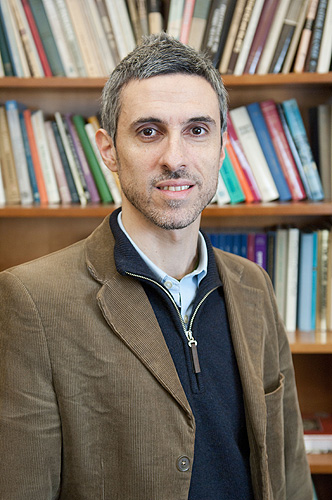
Claudio Benzecry grew up in a musical family. His father is a conductor. His brother is a composer. He took violin lessons, and plays the double bass and the African drum.
But he is not in a hurry to attend the opera anytime soon.
That could be because Benzecry, an assistant professor of sociology in the College of Liberal Arts and Sciences, spent more than 140 nights at the opera as part of his research on opera audiences.
Benzecry’s book The Opera Fanatic, Ethnography of an Obsession will be published in July by the University of Chicago Press. It is based on three years of fieldwork and archival research, and 44 in-depth interviews.
The book points out that opera lovers are as obsessed with the opera as new lovers are with each other.
“This is very much like a falling-in-love narrative,” he says. “Opera is their first flame and they develop a passionate attachment. Some of these people are so interested in opera that they will see anything that has opera in the title. Many go to the opera nine or 10 times a month, hide the fact that they go so often, and commonly have an arrangement with their spouse so they can go alone.”
The opera fans consider themselves “virgins” if they have not seen a particular opera, and enjoy seeing the same opera over and over so they can compare one production to another.
“Fans conceive of opera as a meaningful activity that offers them a stage on which to enact certain values, feel in public, and express themselves as superior and highly refined beings among equals,” he says.
Benzecry’s research was conducted mostly in Buenos Aires, where he earned his master’s degree. There, many of the obsessed fans stand – even for four-hour productions – to save money on ticket prices. “They stand up because those tickets are half the cost of attending a movie,” he says.
But audiences in New York and Europe are also obsessed; Benzecry discovered when he continued his work while a Ph.D. student at New York University.
For many of the fans, opera also becomes a pilgrimage, with vacations spent traveling on “cultural tours” of opera performances. Others collect old tapes and recordings and internalize performances recorded before they were born.
But Benzecry did find one major difference between opera in Argentina and Europe and opera in the U.S. In Buenos Aires, the government subsidizes more than 82 percent of the cost of the productions, while in Europe, 40 to 60 percent is subsidized. In the U.S., there is no subsidy.
“In the United States, opera is very much related to class, while in Europe it is part of the national culture,” Benzecry says. “Buenos Aires was a purer case to study the love for opera, because the fans are without regard for status or other symbolic and economic gains.”


